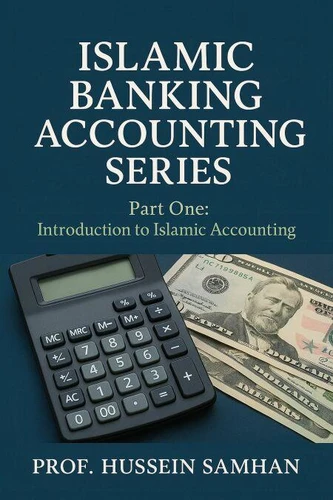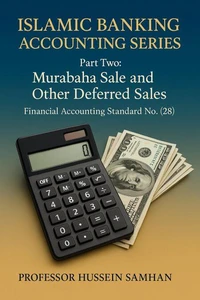Islamic Banking Accounting Series. Part One : Introduction To Islamic Accounting, #1
Par :Formats :
Disponible dans votre compte client Decitre ou Furet du Nord dès validation de votre commande. Le format ePub est :
- Compatible avec une lecture sur My Vivlio (smartphone, tablette, ordinateur)
- Compatible avec une lecture sur liseuses Vivlio
- Pour les liseuses autres que Vivlio, vous devez utiliser le logiciel Adobe Digital Edition. Non compatible avec la lecture sur les liseuses Kindle, Remarkable et Sony
 , qui est-ce ?
, qui est-ce ?Notre partenaire de plateforme de lecture numérique où vous retrouverez l'ensemble de vos ebooks gratuitement
Pour en savoir plus sur nos ebooks, consultez notre aide en ligne ici
- FormatePub
- ISBN8230617747
- EAN9798230617747
- Date de parution13/05/2025
- Protection num.pas de protection
- Infos supplémentairesepub
- ÉditeurIndependently Published
Résumé
This book is part of a series designed to serve Islamic financial institutions, researchers, and university students. The author has drawn on his academic and practical experience to address Islamic banking operations, Islamic insurance (Takaful), and other Islamic financial institutions in light of the Islamic accounting standards issued by the Accounting and Auditing Organization for Islamic Financial Institutions (AAOIFI).
This is the first volume of the series, which discusses the characteristics and features of Islamic accounting and its fundamental differences from conventional financial accounting in general-and from conventional financial-institution accounting in particular. It also explains the scholarly rationale behind issuing Islamic accounting standards and the choice of the term "Islamic accounting."In the forthcoming volumes, the author will detail the practical procedures for Islamic finance operations in Islamic banks, the related accounting entries, and their treatment under the AAOIFI standards.
At the end of the series, the methodology for preparing the multi-step income statement for Islamic banks will be presented-an area that requires a clear understanding of Islamic accounting standards. Below is the table of contents for this first volume of the series : 1-1 Science of financial accounting.1-2 Accounting in Islam.1-3 Rationale for Calling It "Islamic Accounting".1-4 Characteristics of Accounting Science in Islam.1-5 Accounting in Islam: Underlying Assumptions andPrinciples.1-6 Accounting and Auditing Organization for Islamic Financial Institutions (AAOIFI).1-7 Adoption of Islamic Accounting Standards1-8 The concept of the Islamic bank.1-9 Objectives of Financial Accounting for Islamic Banks.1-10 International Accounting Standards (IAS) and International Financial Reporting Standards (IFRS).1-11 Use of International Accounting Standards and International Financial Reporting Standards by Islamic Financial Institutions.1-12 Characteristics of accounting standards.1-13 The Need for Specialized Accounting Standards for Islamic Financial Institutions.1-14 Why are Islamic accounting standards issued despite the existence of international accounting standards?.1-15 The most important modern professional certificates in the field of accounting for Islamic financial institutions.
This is the first volume of the series, which discusses the characteristics and features of Islamic accounting and its fundamental differences from conventional financial accounting in general-and from conventional financial-institution accounting in particular. It also explains the scholarly rationale behind issuing Islamic accounting standards and the choice of the term "Islamic accounting."In the forthcoming volumes, the author will detail the practical procedures for Islamic finance operations in Islamic banks, the related accounting entries, and their treatment under the AAOIFI standards.
At the end of the series, the methodology for preparing the multi-step income statement for Islamic banks will be presented-an area that requires a clear understanding of Islamic accounting standards. Below is the table of contents for this first volume of the series : 1-1 Science of financial accounting.1-2 Accounting in Islam.1-3 Rationale for Calling It "Islamic Accounting".1-4 Characteristics of Accounting Science in Islam.1-5 Accounting in Islam: Underlying Assumptions andPrinciples.1-6 Accounting and Auditing Organization for Islamic Financial Institutions (AAOIFI).1-7 Adoption of Islamic Accounting Standards1-8 The concept of the Islamic bank.1-9 Objectives of Financial Accounting for Islamic Banks.1-10 International Accounting Standards (IAS) and International Financial Reporting Standards (IFRS).1-11 Use of International Accounting Standards and International Financial Reporting Standards by Islamic Financial Institutions.1-12 Characteristics of accounting standards.1-13 The Need for Specialized Accounting Standards for Islamic Financial Institutions.1-14 Why are Islamic accounting standards issued despite the existence of international accounting standards?.1-15 The most important modern professional certificates in the field of accounting for Islamic financial institutions.
This book is part of a series designed to serve Islamic financial institutions, researchers, and university students. The author has drawn on his academic and practical experience to address Islamic banking operations, Islamic insurance (Takaful), and other Islamic financial institutions in light of the Islamic accounting standards issued by the Accounting and Auditing Organization for Islamic Financial Institutions (AAOIFI).
This is the first volume of the series, which discusses the characteristics and features of Islamic accounting and its fundamental differences from conventional financial accounting in general-and from conventional financial-institution accounting in particular. It also explains the scholarly rationale behind issuing Islamic accounting standards and the choice of the term "Islamic accounting."In the forthcoming volumes, the author will detail the practical procedures for Islamic finance operations in Islamic banks, the related accounting entries, and their treatment under the AAOIFI standards.
At the end of the series, the methodology for preparing the multi-step income statement for Islamic banks will be presented-an area that requires a clear understanding of Islamic accounting standards. Below is the table of contents for this first volume of the series : 1-1 Science of financial accounting.1-2 Accounting in Islam.1-3 Rationale for Calling It "Islamic Accounting".1-4 Characteristics of Accounting Science in Islam.1-5 Accounting in Islam: Underlying Assumptions andPrinciples.1-6 Accounting and Auditing Organization for Islamic Financial Institutions (AAOIFI).1-7 Adoption of Islamic Accounting Standards1-8 The concept of the Islamic bank.1-9 Objectives of Financial Accounting for Islamic Banks.1-10 International Accounting Standards (IAS) and International Financial Reporting Standards (IFRS).1-11 Use of International Accounting Standards and International Financial Reporting Standards by Islamic Financial Institutions.1-12 Characteristics of accounting standards.1-13 The Need for Specialized Accounting Standards for Islamic Financial Institutions.1-14 Why are Islamic accounting standards issued despite the existence of international accounting standards?.1-15 The most important modern professional certificates in the field of accounting for Islamic financial institutions.
This is the first volume of the series, which discusses the characteristics and features of Islamic accounting and its fundamental differences from conventional financial accounting in general-and from conventional financial-institution accounting in particular. It also explains the scholarly rationale behind issuing Islamic accounting standards and the choice of the term "Islamic accounting."In the forthcoming volumes, the author will detail the practical procedures for Islamic finance operations in Islamic banks, the related accounting entries, and their treatment under the AAOIFI standards.
At the end of the series, the methodology for preparing the multi-step income statement for Islamic banks will be presented-an area that requires a clear understanding of Islamic accounting standards. Below is the table of contents for this first volume of the series : 1-1 Science of financial accounting.1-2 Accounting in Islam.1-3 Rationale for Calling It "Islamic Accounting".1-4 Characteristics of Accounting Science in Islam.1-5 Accounting in Islam: Underlying Assumptions andPrinciples.1-6 Accounting and Auditing Organization for Islamic Financial Institutions (AAOIFI).1-7 Adoption of Islamic Accounting Standards1-8 The concept of the Islamic bank.1-9 Objectives of Financial Accounting for Islamic Banks.1-10 International Accounting Standards (IAS) and International Financial Reporting Standards (IFRS).1-11 Use of International Accounting Standards and International Financial Reporting Standards by Islamic Financial Institutions.1-12 Characteristics of accounting standards.1-13 The Need for Specialized Accounting Standards for Islamic Financial Institutions.1-14 Why are Islamic accounting standards issued despite the existence of international accounting standards?.1-15 The most important modern professional certificates in the field of accounting for Islamic financial institutions.




